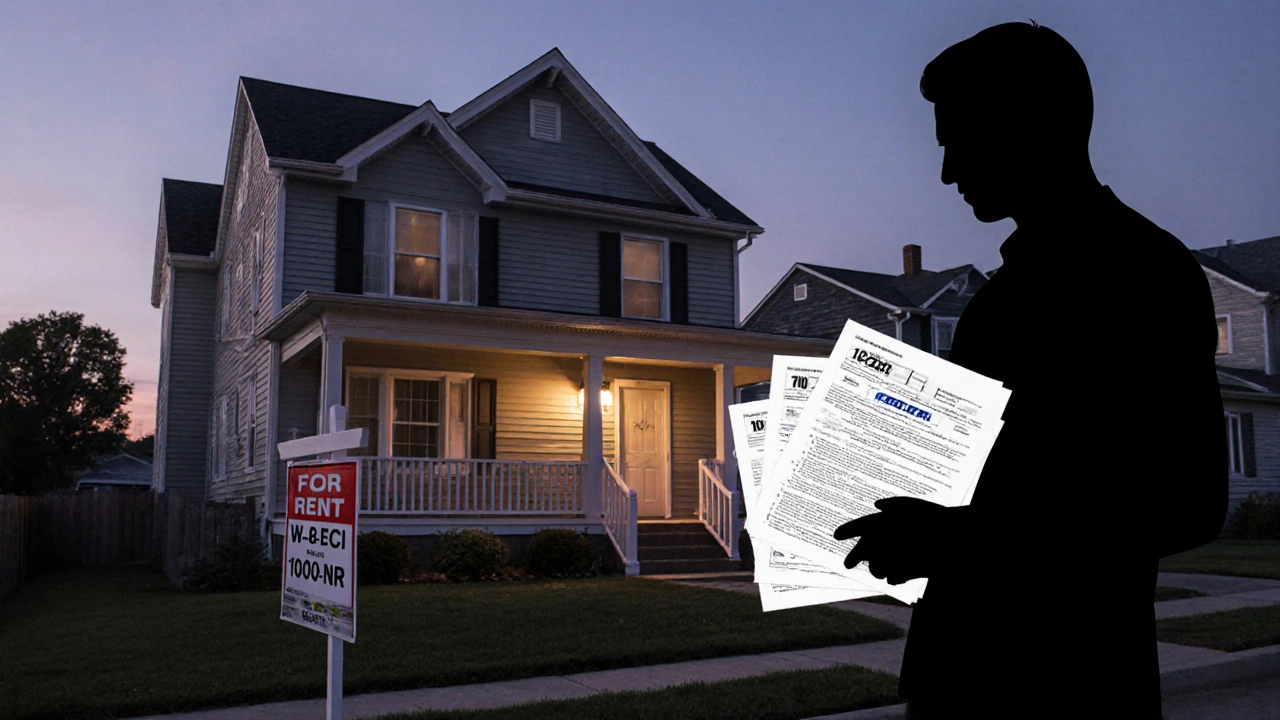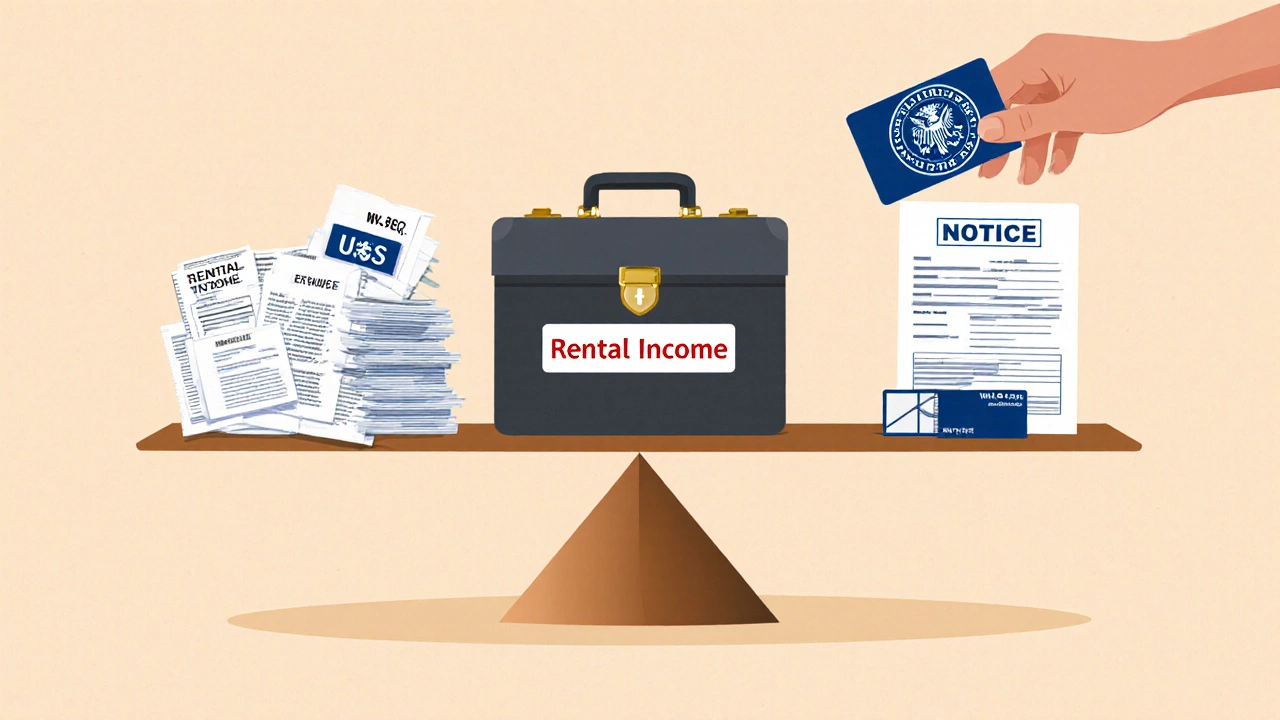Who Is a Non-Resident Landlord? Simple Guide to Rules and Responsibilities

Nov, 20 2025
Non-Resident Landlord Tax Calculator
How the U.S. Tax Withholding Works
As a non-resident landlord, the U.S. government requires 30% of your gross rental income to be withheld for taxes. However, if you file Form W-8ECI, you can often reduce this withholding to your actual tax rate.
Example: If you earn $21,600 in rent annually with $12,000 in expenses, you might pay $1,500 in taxes instead of $6,480 in withholding. That's $4,980 you could get back when you file your return.
Enter Your Rental Details
Your Tax Results
Gross Annual Rent: $0
30% Withholding Amount: $0
Net After Withholding: $0
Estimated Tax Liability (after W-8ECI): $0
Potential Refund: $0
Note: This calculator provides an estimate. Actual tax liability depends on your specific situation and tax bracket. Consult a tax professional specializing in non-resident landlord issues.
If you own a rental property in the U.S. but live somewhere else - maybe in Canada, Mexico, or even overseas - you’re a non-resident landlord. It sounds simple, but the rules around taxes, reporting, and legal duties can get messy fast. Many people think owning a rental home is just about collecting rent, but if you’re not living in the country, the government treats you differently. And if you skip the steps, you could end up with penalties, frozen bank accounts, or even a tax lien on your property.
What Exactly Makes Someone a Non-Resident Landlord?
A non-resident landlord is someone who owns rental property in the United States but doesn’t live here. That’s it. No visa status, no citizenship requirement, no minimum stay. If you’re renting out a house, condo, or apartment in the U.S. and your primary home is outside the country, you’re classified as a non-resident landlord by the IRS and state tax agencies.
It doesn’t matter if you’re a Canadian retiree with a vacation home in Florida, a German investor buying a duplex in Chicago, or a U.K. citizen who inherited a property in California. If you’re collecting rent from U.S. soil, you’re subject to U.S. tax rules - even if you never set foot in the country.
Some people confuse this with being a non-resident alien for immigration purposes. That’s a different category. For tax purposes, the only thing that matters is where your rental income comes from - not where you sleep at night.
Why Does It Matter? The Tax Trap
Here’s the big catch: the U.S. government doesn’t trust foreign landlords to file their own taxes. So they made a rule: if you’re a non-resident landlord, your tenant or property manager must withhold 30% of your gross rent and send it to the IRS. That’s right - 30% of every rent check, no deductions, no exceptions.
Let’s say you rent out a one-bedroom apartment for $1,800 a month. Your tenant pays $1,800. The property manager takes $540 (30%) and sends it to the IRS. You get $1,260. That’s not your net profit. That’s just your rent after withholding. You still have to file a U.S. tax return to claim expenses like repairs, property taxes, insurance, and depreciation. If you do it right, you might get most of that $540 back.
But if you don’t file, the IRS keeps the full $540. And they’ll keep taking it every month until you do. There’s no automatic refund. You have to ask for it.
Who Handles the Withholding?
If you have a property manager, they’re legally responsible for withholding the 30%. Most reputable managers know this and do it automatically. But if you’re renting directly to a tenant - say, you listed it on Zillow yourself - then they are legally required to withhold the 30% and pay it to the IRS.
Most tenants don’t know this. They think they’re just paying rent. So if you’re renting directly, you need to tell your tenant in writing: “You must withhold 30% of rent and pay it to the IRS. If you don’t, you could be held personally liable.”
That’s not a suggestion. That’s IRS Regulation §1.1446-1. If the tenant doesn’t withhold and you don’t file, the IRS can come after the tenant for the full amount. That’s why most tenants refuse to rent from non-resident landlords unless they’re working through a manager.
How to Avoid the 30% Withholding
You can cut that 30% down to your actual tax rate - often much lower - by filing Form W-8ECI with your tenant or property manager. This form says: “I’m earning rental income that’s effectively connected with a U.S. trade or business.”
Once they have your W-8ECI, they stop withholding the 30%. You still have to file a U.S. tax return (Form 1040-NR), but now you can deduct expenses. You pay tax only on your net profit, not your gross rent.
Example: You earn $21,600 in rent a year. Your expenses (mortgage interest, repairs, property tax, management fee) total $12,000. Your net income is $9,600. Without W-8ECI, $6,480 is withheld. With W-8ECI, you pay maybe $1,500 in taxes (depending on your bracket) and get back $4,980 when you file.
It’s not complicated. Just fill out the form, give it to your manager or tenant, and keep a copy. Do it before you collect your first rent check.

Registration and Local Rules
Taxes aren’t the only thing you need to handle. Many cities require non-resident landlords to register their rental properties. Los Angeles, San Francisco, New York, Chicago - they all have rules. Some require you to name a local agent who can receive legal notices. Others require you to get a business license or pay an annual fee.
For example, in Los Angeles, if you own a rental property and don’t live in the city, you must register with the Housing Department. You need to provide your out-of-state address, name a local agent, and pay a $100 fee every two years. Skip this, and you can’t legally rent the property.
Don’t assume your property manager handles this. Most don’t. They handle rent and repairs. Registration? That’s your job. Check your city’s website. Look for “non-resident landlord registration” or “rental property ordinance.”
What Happens If You Ignore It?
Ignoring the rules doesn’t make them go away. The IRS can freeze your bank accounts. They can put liens on your property. They can even block you from selling it until you pay back taxes plus penalties.
States are just as strict. In California, if you don’t register your rental, you can’t evict a tenant - even if they stop paying rent. You’re stuck. You can’t collect late fees. You can’t legally terminate the lease. The tenant can stay for free until you fix the paperwork.
And if you try to sell the property later? Title companies will check. If your registration or tax filings are missing, they won’t close the sale. You could lose your buyer - or have to pay thousands in back fees and penalties just to clear the title.
What You Should Do Right Now
If you’re a non-resident landlord, here’s your checklist:
- Confirm you’re not already registered with your city’s housing department.
- Find out if your state requires a local agent. If yes, name one - a friend, lawyer, or property manager.
- File Form W-8ECI with your tenant or property manager to stop 30% withholding.
- Keep records of all expenses: receipts, invoices, bank statements.
- Plan to file Form 1040-NR every year by June 15 (extended from April 15 for non-residents).
You don’t need a CPA to do this - but you do need to be organized. Many non-resident landlords save thousands by filing correctly. Others lose thousands by pretending it doesn’t apply to them.

Common Myths About Non-Resident Landlords
- Myth: “I don’t make enough to owe taxes.”
Truth: Even if your net profit is $1, you still have to file. The IRS doesn’t care how small it is. - Myth: “I’m not a U.S. citizen, so they can’t touch me.”
Truth: The IRS doesn’t care about your passport. They care about your property. They can seize assets in the U.S. - Myth: “My property manager handles everything.”
Truth: They handle rent and repairs. Taxes and registration? That’s on you. - Myth: “I only rent it out part of the year, so I’m exempt.”
Truth: Any rental income - even one month - triggers tax and registration rules.
What If You’re Already Behind?
If you’ve been renting for years and never filed, don’t panic. The IRS has a program called the Streamlined Foreign Offshore Procedures. It lets you catch up on past filings with reduced or no penalties - if you act before they come after you.
Start by gathering your rental records: rent payments, expense receipts, bank statements. Then hire a tax professional who’s handled non-resident landlord cases before. Don’t try to file yourself unless you’ve done this before. Mistakes here can cost more than the original tax bill.
States are less forgiving. California, for example, doesn’t have a formal amnesty program. But if you register now and pay back fees, they usually won’t go after you for past years - unless you’re being audited.
Final Thought: It’s Not About Fear - It’s About Control
Owning rental property overseas is a smart move. You’re building wealth, diversifying assets, and earning passive income. But if you ignore the rules, you’re handing control to the IRS and local governments. You’re letting them decide how much you keep - and when you can sell.
Take the steps. File the forms. Register the property. Keep the receipts. You’re not breaking the law by being a non-resident landlord. You’re just not following the rules. Fix that, and your rental property becomes a clean, reliable source of income - not a legal headache.